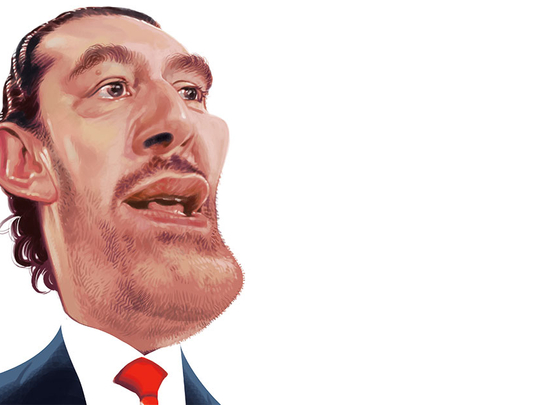
Out of nowhere, on November 4, Lebanon’s prime minister Sa’ad Hariri took the region by storm by announcing his resignation. The announcement came not from his office in Beirut, but from his residence in Riyadh. He said he believed there was an assassination plot against him and accused Iran and its Lebanese proxy Hezbollah of destroying the region’s stability.
Under Lebanon’s confessional political set up, the president of the country is, by law, a Maronite Christian, the prime minister a Sunni, and the speaker of parliament a Shiite. And the Hariri family is by far the biggest pillar of Sunni politics in Lebanon. The Future Movement, which was set up by Sa’ad’s assassinated father Rafik Hariri, and which Sa’ad has headed since 2005, is essentially the political voice of Sunnis of Lebanon.
Sa’ad became prime minister of Lebanon last year in a political deal that made the Hezbollah-allied Maronite Christian politician Michel Aoun President. The coalition government that resulted had nearly all of Lebanon’s political blocs as members, including Hezbollah.
The Hariris have always had deep ties with Saudi Arabia, which has provided tremendous political and financial support to Lebanon for a long time. Like his father before him, Sa’ad holds both Lebanese and Saudi citizenship.
Rafik had first arrived in Saudi Arabia in 1965. By the late 1970s, he was an immensely wealthy businessman. He used much of his own money to fund philanthropic projects in his homeland, which gained him a lot of goodwill — enough for him to enter Lebanese politics. The 1990 Taif Accords — which were mediated by Saudi Arabia and took place in the Saudi city of Taif — marked the end of the 15-year-long Lebanese civil war. Rafik had played a key role in the lead-up to the talks. He would go on to become prime minister of Lebanon five times and earn the nickname “Mr Lebanon”. It was after his brutal death in a massive car bomb explosion in Beirut in 2005 — for which Hezbollah operatives are being tried in absentia — that his younger son Sa’ad was thrust into the whirlpool of Lebanese politics.
Like some other scions of powerful political dynasties — India’s former prime minister Rajiv Gandhi comes to mind — Sa’ad was initially reluctant to enter politics. Earlier, Sa’ad had helped manage his father’s multibillion dollar businesses. He was born in Riyadh in 1970; his mother was Rafik’s first wife, Iraqi Nida Bustani. He graduated in 1992 from McDonough School of Business at Georgetown University in Washington and joined his father’s vast business empire. According to Forbes, Sa’ad is currently worth $1.1 billion (Dh4.04 billion).
After his father’s death, Sa’ad, instead of taking over the reins of the Lebanese premiership himself, backed seasoned politician and close friend of his father’s, Fouad Siniora, to become prime minister. Siniora was at the helm from July 2005 to November 2009, following which, Sa’ad became the prime minister of Lebanon for the first time.
Before that, Sa’ad’s first political successes came in the form of securing a financial aid package from the United States in 2007, largely as a result of his lobbying effort and his mediation that helped in the formation of a unity government in 2008.
The March 14 Coalition — named as such to commemorate the day massive crowds gathered in Beirut to demand the end of the Syrian regime’s suffocating, decades-long presence in Lebanon, following the assassination of Rafik — won the elections held in June 2009. Hariri became prime minister-designate. The then president Michel Sulaiman asked him to form a new government — no easy task in a system as complex as that of Lebanon. Hariri, after trying for many weeks, gave up and said that he would step down from his prime minister-designate post. But Sulaiman persuaded him to try again and, in November, Hariri finally announced the formation of a unity government. He also became prime minister.
Meanwhile, as the international tribunal investigating the assassination of Rafik gathered steam, tensions arose over Lebanon’s participation in the tribunal, with the March 14 coalition engaged in a tussle with Hezbollah over the issue. In 2011, the resignation of 11 Hezbollah MPs forced the collapse of the unity government, and Hariri became caretaker prime minister, handing over the reins to Najeeb Mikati later. Mikati had the support of Hezbollah. Hariri adopted a principled stance and refused to be part of any government that was dominated by Hezbollah. The eventual government had no ministers from the March 14 coalition.
Also in 2011, when Syria’s brutal conflict began, Hariri — like most Sunnis in Lebanon — came out clearly against his old nemesis, the dictatorship of Syrian President Bashar Al Assad, which Sa’ad also blamed for the assassination of his father. In 2012, the Syrian regime issued an “arrest warrant” against Sa’ad for his alleged support for Syrian rebels. Hariri promptly responded by branding Al Assad a “monster”. Sensing imminent danger from the Syrian regime or its allies in Lebanon, he moved to Paris along with his wife and three children in 2011. He only returned in 2014.
The period that followed was one of political paralysis in Lebanon, with the country being unable to agree on electing a president. Following several rounds of deliberations, a deal was finally struck under which long-time aspirant Aoun was elected President, and he signed a decree appointing Hariri as prime minister. Thus, Hariri became premier for the second time on December 18, 2016.
But less than a year later, he was to announce his surprise resignation.









